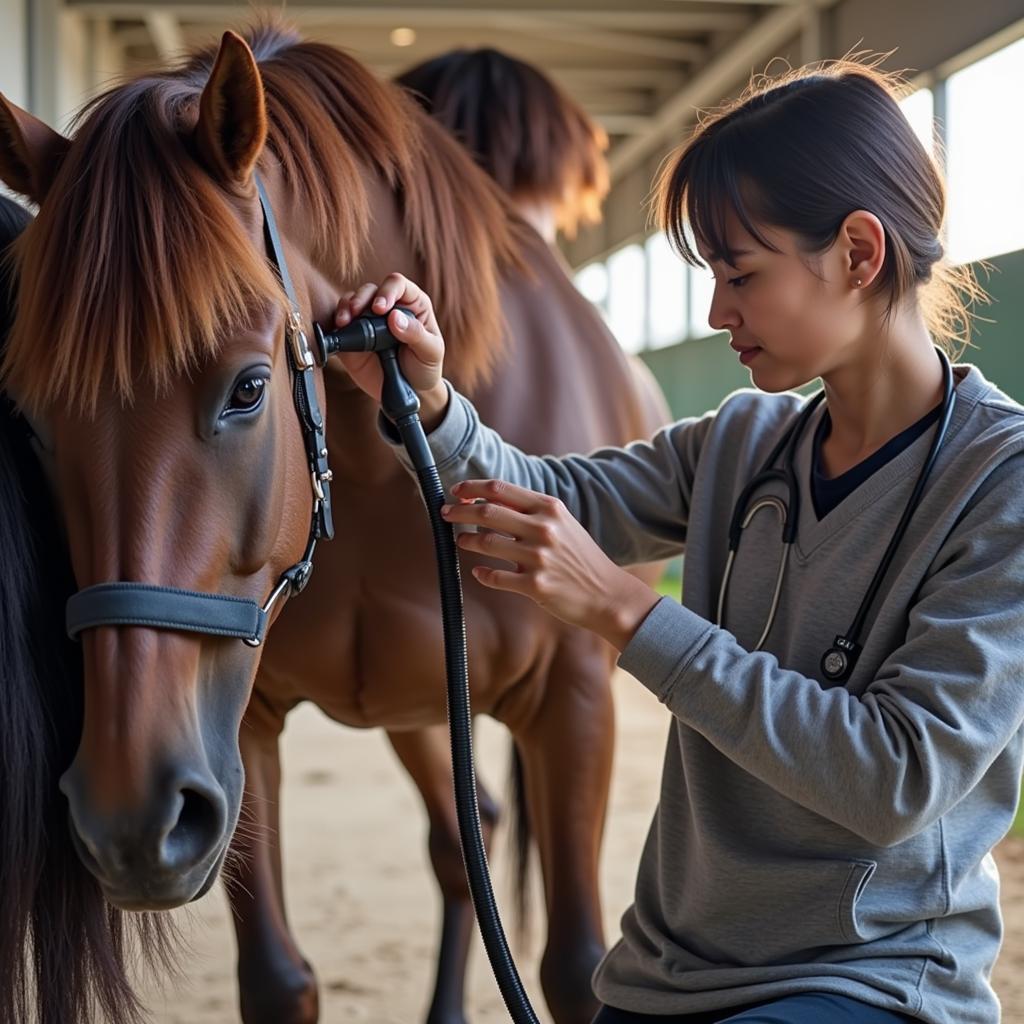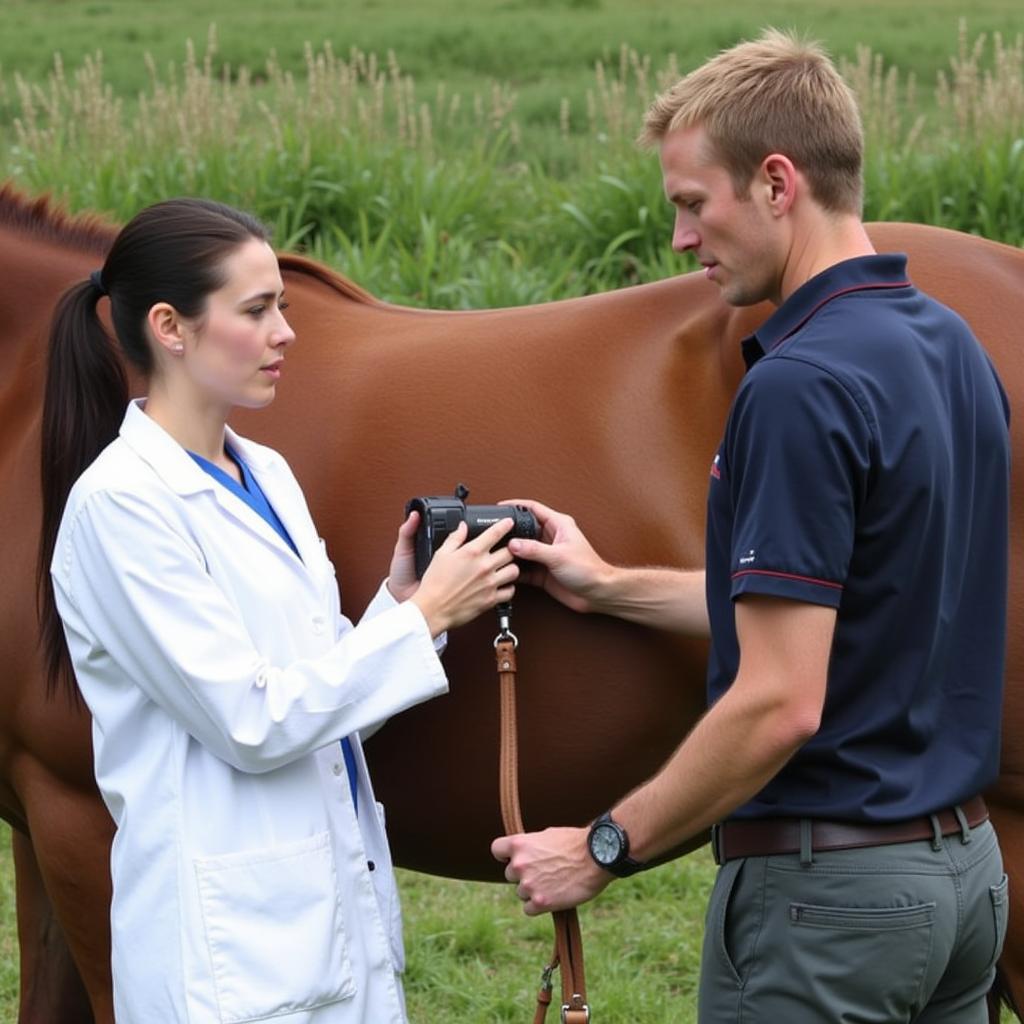The search term “Horse Facial Cumshots” often leads to misinformation and potentially harmful content. While curiosity about animal reproduction is natural, it’s crucial to approach the topic with respect and a focus on accurate, ethical information. This article aims to provide a clear understanding of equine reproductive behavior, addressing the underlying curiosity behind the search term while promoting responsible animal care.
The Reality of Equine Breeding
It’s important to clarify that the term “horse facial cumshots” doesn’t accurately reflect the natural breeding process in horses. While ejaculation is part of reproduction, the focus should be on understanding the entirety of equine reproductive behavior, including courtship, mating, and the care of mares and foals. Focusing solely on one aspect can lead to a distorted and potentially harmful perspective.
The Role of Hormones
Hormonal changes play a significant role in equine reproductive behavior. Mares experience estrus cycles, commonly referred to as “heat,” which signal their readiness to breed. Stallions, on the other hand, are generally capable of breeding year-round, but their behavior can be influenced by the presence of mares in estrus.
Natural Breeding vs. Artificial Insemination
Natural breeding involves the stallion mounting the mare and depositing sperm directly into the vagina. Artificial insemination (AI) is another common practice, where collected semen is introduced into the mare’s uterus using specialized equipment. Both methods have their advantages and disadvantages, and the choice depends on various factors, including the availability of a stallion, the mare’s reproductive health, and the breeder’s goals.
 Artificial Insemination in Horses
Artificial Insemination in Horses
Responsible Horse Ownership and Breeding
Responsible horse ownership involves understanding and respecting the natural behaviors of these animals. When it comes to breeding, careful planning and management are essential to ensure the health and well-being of both the mare and the foal.
Ethical Considerations
Breeding horses carries significant ethical responsibilities. Breeders should prioritize the welfare of the animals, ensuring proper nutrition, veterinary care, and suitable living conditions. Overbreeding and irresponsible breeding practices can lead to unwanted horses and contribute to the existing equine overpopulation problem.
Seeking Professional Guidance
For those interested in learning more about equine reproduction, consulting with a qualified equine veterinarian or experienced breeder is highly recommended. These professionals can provide accurate information, address specific questions, and offer guidance on responsible breeding practices.
Addressing Misconceptions
It’s crucial to address the misconceptions surrounding the search term “horse facial cumshots.” The term itself objectifies the animals and reduces a complex natural process to a single act. Focusing on accurate and respectful language is essential when discussing equine reproduction.
 Veterinarian Examining a Mare
Veterinarian Examining a Mare
Conclusion
Understanding equine reproductive behavior requires a holistic approach that considers the natural instincts of horses, the ethical implications of breeding, and the importance of responsible animal care. By seeking accurate information and avoiding sensationalized depictions, we can foster a greater appreciation for these magnificent animals and contribute to their well-being. The term “horse facial cumshots” ultimately detracts from a comprehensive understanding of equine reproduction and should be replaced with a focus on responsible and respectful learning.
FAQ
- What is the typical gestation period for a mare? (Approximately 11 months)
- How often do mares go into heat? (Every 19-21 days during the breeding season)
- What is the best age to breed a mare? (Typically after they reach physical maturity, around 4-5 years old)
- What are the signs of a mare in heat? (Frequent urination, winking of the vulva, and interest in stallions)
- What are the risks associated with horse breeding? (Dystocia, retained placenta, and neonatal illnesses)
- How can I find a reputable horse breeder? (Consult with your veterinarian, local equine organizations, or breed registries)
- What are the responsibilities of a horse breeder? (Ensuring the health and well-being of the mare and foal, providing proper nutrition and care, and finding suitable homes for the offspring.)
For further assistance, please contact us at Phone Number: 0772127271, Email: [email protected] or visit our address: QGM2+WX2, Vị Trung, Vị Thuỷ, Hậu Giang, Việt Nam. We have a 24/7 customer support team.